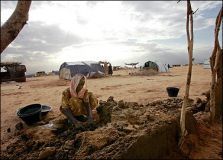Mediators to seek leaders’ intervention in Sudan’s Darfur talks
ABUJA, Nigeria, Dec 19, 2004 (PANA) — African Union mediators at the Darfur talks in Abuja have resolved to seek the intervention of AU chairman and Nigerian President Olusegun Obasanjo, and other African leaders, after the talks suffered a serious setback Saturday.

|
|
A displaced woman of the Darfur region of Sudan prepares mud bricks for her hut in July 2004 in the Abu Shouk displaced camp. (AFP). |
The decision came after a meeting in the Nigerian capital between the AU and its partners at the talks, following the revelation that the warring parties failed to respect a 24-hour ultimatum to end fresh hostilities in Sudan’s western region of Darfur.
The AU Friday asked the parties to stop fresh fighting in Darfur by 6 pm local time on Saturday and the government to withdraw its troops to pave way for the resumption of the stalled fourth round of the talks in Abuja.
It threatened to report further violations of the April ceasefire
between the Sudanese government and the two main rebel groups —
Sudan Liberation Army/Movement (SLA/M) and the Justice and
Equality Movement (JEM) — to the UN Security Council for
possible sanctions.
AU Spokesman Assane Ba said after Saturday’s AU/Partners meeting
that the general agreement was that the talks had suffered
“serious setbacks” following repeated and continued violations of
ceasefire agreements and failure by the government to withdraw
its troops by 6 pm Saturday.
“We have just finished a meeting of the mediators and its
partners at which the chairman of the ceasefire committee,
General (Festus) Okonkwo, confirmed to the meeting that as at
6.30 pm today (Saturday), fighting is still going on in Labado
(Darfur),” Ba said.
Ba said as the meeting was going on, Okonkwo affirmed reports
that a helicopter was being used to bomb locations in Labado by
the government forces.
“This clearly shows that they have not withdrawn their troops as
directed by the AU,” Ba said, adding: “We will meet with the
parties today and brief President Obasanjo and other leaders on
the situation and await their directive on what to do next.”
He was, however, optimistic that the leaders would be able to
rescue the situation.
“The situation on the ground is very bad and I just hope that a
miracle happens by tomorrow (Sunday),” he assured.
Contacted for comments on the development, JEM spokesman Ahmed
Togodt reiterated the position of the movement not to participate
in further discussions unless the government withdraws its troops
from the disputed areas.
“We cannot be talking here while the government of Sudan is
launching attacks and refusing to withdraw its troops as directed
by the mediators. The government is not sincere and we cannot be
fooled any more,” he said.
Also affirming his organisation’s decision to stay away from the
talks, SLA spokesman Hussain Magzoub said: “We will not
participate in the discussions until the government side honours
the ceasefire agreement.”
But at a press conference Saturday, the government delegation
said it had halted all military operations in the area and
started the withdrawal of its troops to their previous positions.
Explaining the fresh attacks launched by the government,
spokesman Najeb Abdelwahab said the action of the government was
in defence of its forces being attacked by the movements in
Labado.
“It was the action of the movements that escalated the situation
in Labado,” he said.
“Despite the negative position of the movements, the government
of Sudan delegation would like to affirm its full commitment and
adherence to the language of dialogue and negotiations, despite
the difficulties and obstacles,” Abdelwahab said.
The fourth round of the talks, aimed at ending almost two years
of fighting which has claimed more than 70,000 lives and forced
over two million people from their homes, stalled two days after
it opened in Abuja.
The rebels walked out in protest at what they called fresh
government attacks, and vowed not to return to the table until
the government withdraws its troops from the disputed areas.
